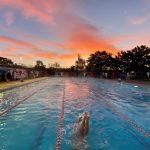How to train for mental fitness
Top athletes know that better begins in your mind, and that performing at your best in sport all depends on a strong mental foundation.
When Michael Phelps had the goal of winning eight gold medals, he said: “I think that everything is possible as long as you put your mind to it and you put the work and time into it. I think your mind really controls everything.”
While it is clear that developing the right mindset is the foundation for improving in all areas of life, two questions arise:
- What methods are the best to start implementing?
- How can we train our mind to be better equipped for swimming?
We have compiled three proven training techniques and an exercise at the end of this article to get you started.
Visualisation
Visualisation is a powerful tool to bring the reality in your life that you desire. Used by high performers in business and sports alike, the main idea behind visualisation is to picture successful outcomes before they actually occur. You can use guided visualisations or create your very own visualisation by writing it down and picturing it, eyes-closed, afterwards.
We all enjoy a good day-dream session about an amazing swim, so why not make it a practice? As Michael Phelps experienced a swimmers nightmare in 2008, when his goggles sprung a leak making him blind, he not only won a gold medal, but also established a new world record. How did he do it? He claims that he visualised winning long before and when he actually won he said: “it felt like I imagined it would”. This shows the true power of visualisation.
Affirmation
Negative self talk is common for a lot of people. We all have been in a situation where we felt as if we were not good enough or not able to succeed. This sets us up for failure to achieve our desired outcome. Using affirmations can help you to build confidence about a desired outcome. The fact is that the mind cannot differentiate between what is real or what is simply imagination. Neuroscience proves that self-affirmation activates brain circuitry involved in self processing and valuation. This leads to the maintenance of a positive self view and more resilience when self-competence is threatened by adversity.
To get started, simply write down strong positive statements associated with your self judgement. One example could be: I’m a strong swimmer and I can do this. By repeating your affirmation over and over, you internalise the words into your subconscious. Ultimately, this helps facing unfamiliar and uncomfortable situations with confidence.
(Mindfulness) Meditation
While meditation was long perceived as “hippie stuff”, it is now scientifically proven to be beneficial for all kinds of groups of people, including swimmers.
Meditation is one of the simplest and yet one of the most challenging practices out there. The main goal is to sit still and focus inward.
What benefits does this have for swimming? Mindfulness meditation is proven to enhance one’s ability of getting into a “flow” state or in the “zone”. By enabling the mind to actively and continuously focus, meditation teaches us to deal with outside distraction. This led, in a study with elite swimmers, to measurable performance enhancements in competitions.
A great way to start, besides listening to guided meditation, is to focus on the breath. It is recommended to begin with as little as two minutes and increase this period over time. Just set yourself a timer, sit straight, close your eyes and take a deep in and exhale. When you find it challenging to keep this focus because your mind drifts off into thoughts and emotions, try counting the breaths, until you reach 5 and then start back at 1.
Practical exercise
As we all know, it can be tough to keep up confidence in challenging situations.
A stubborn focus on winning versus losing fuels the fear of not meeting expectations. Shifting your focus away from winning or losing to growing and learning is a proven strategy to tame that fear and keep your confidence. For this, gratitude training is the go-to technique used by athlete coaches around the globe.
To start, think of a typical situation that makes you feel uncomfortable. What is it that makes you feel insecure and why? This could be a certain place, certain people, situation etc.:
Now identify the growth opportunity within. What can this situation teach you ? What could you be thankful for?
An example could be that participating in an outdoor swimming event that gives you negative feelings of anxiety and self-doubt. Now reframe your mindset to enable your body and mind to perform better. One way could be to shift your mind towards the learning aspects instead of your performance. For example, you could instead think: “This swimming challenge will teach me a lot about myself and I will have an opportunity to get to know other swimmers.” As this applies independently to your success in the swim, your relationship to the situation might change.
Once you do this on a regular basis, you train your mind to focus on growth opportunities rather than the negative feelings involved.
References and further reading
(1) Heckman, Christopher, “The Effect of Mindfulness and Meditation in Sports Performance” (2018). Kinesiology, Sport Studies, and Physical Education Synthesis Projects. 47. https://digitalcommons.brockport.edu/pes_synthesis/47
(2) Christopher N. Cascio, Matthew Brook O’Donnell, Francis J. Tinney, Matthew D. Lieberman, Shelley E. Taylor, Victor J. Strecher, Emily B. Falk, Self-affirmation activates brain systems associated with self-related processing and reward and is reinforced by future orientation, Social Cognitive and Affective Neuroscience, Volume 11, Issue 4, April 2016, Pages 621–629, https://doi.org/10.1093/scan/nsv136
(3) Bernier, M., Thienot, E., Codron, R., & Fournier, J. F. (2009). Mindfulness and Acceptance Approaches in Sport Performance, Journal of Clinical Sport Psychology, 3(4), 320-333. Retrieved May 22, 2020, from https://journals.humankinetics…
This article has been written for Outdoor Swimmer by Laurin Angermeier, a Neuroscience MSc student at King’s College London and marketing manager for Mindshine.
Mindshine is a digital coach for a healthy mind. All Mindshine exercises & meditations are science based and utilise a wide range of proven techniques from positive psychology and mindfulness to leadership coaching.







